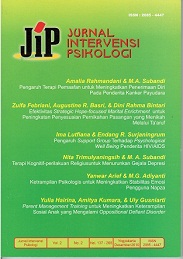Main Article Content
Abstract
Biological, psychological, social, and spiritual impacts of cancer can cause the emergence of negative emotions and affect patient's self-acceptance. Forgiveness therapy is expected to enhance patient's acceptance by releasing them from the negative emotional prison, changing attitudes toward self, others, and/or the situation become more positive, and setting new life goals. This study examined the effect of forgiveness therapy to increase forgiveness and self-acceptance of breast cancer patients. Therapy was given as much as 6 sessions, conducted once a week, for about 80 minutes. Participant was a women who had a breast cancer, had an average score of forgiveness and self-acceptance on the baseline phase measurement. Research design wasA-B-A single-case experimental studies with 3 times forgiveness's measurement, each before intervention, after intervention, and follow-up 2 weeks after intervention. Self-acceptance's measurement was conducted 10 times, 3 times in the baseline phase (before intervention), 6 times in the intervention phase (end of each session), 1 time in reversal phase (follow-up 2 weeks after intervention), with 1 week measurement interval. Hypothesis was tested by using visual inspection and qualitative analysis based on documents during the process of therapy and follow-up interview. The results showed that forgiveness therapy could improve participant's forgiveness and self-acceptance. Changes in both dependent variable remained stable at follow-up. The limitations of this study were further discussed.
Keywords: forgiveness, self-acceptance, breast cancer patientsArticle Details
Authors who publish with this journal agree to the following terms:
- Authors retain copyright and grant the journal right of first publication with the work simultaneously licensed under a Creative Commons Attribution-ShareAlike 4.0 International License that allows others to share the work with an acknowledgment of the work's authorship and initial publication in this journal.
- Authors are able to enter into separate, additional contractual arrangements for the non-exclusive distribution of the journal's published version of the work (e.g., post it to an institutional repository or publish it in a book), with an acknowledgment of its initial publication in this journal.
- Authors are permitted and encouraged to post their work online (e.g., in institutional repositories or on their website) prior to and during the submission process, as it can lead to productive exchanges, as well as earlier and greater citation of published work (See The Effect of Open Access).




